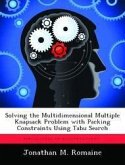The multidimensional knapsack problem (MKP) has been used to model a variety of practical optimization and decision-making applications. Due to its combinatorial nature, heuristics are often employed to quickly find good solutions to MKPs. While there have been a variety of heuristics proposed for the MKP, and a plethora of empirical studies comparing the performance of these heuristics, little has been done to garner a deeper understanding of heuristic performance as a function of problem structure. This dissertation presents a research methodology, empirical and theoretical results explicitly aimed at gaining a deeper understanding of heuristic procedural performance as a function of test problem characteristics. This work first employs an available, robust set of two-dimensional knapsack problems in an empirical study to garner performance insights. These performance insights are tested against a larger set of problems, five-dimensional knapsack problems specifically generated for empirical testing purposes. The performance insights are found to hold in the higher dimensions. These insights are used to formulate and test a suite of three new greedy heuristics for the MKP, each improving upon its successor.








